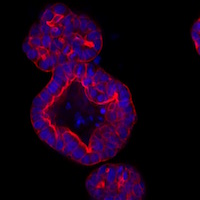Channels
Special Offers & Promotions
Highest Stability Recombinant Wnt3a for Organoid Culture
AMSBIO has introduced recombinant Wnt3a with a new Wnt stabilizer that significantly extends the activity of this protein in serum-free medium from a half-life of just 2 hours to around 30 hours.
 Wnt-3a is a protein that is encoded by the Wnt3a gene. The Wnt gene family consists of structurally related genes that encode secreted signaling proteins. These proteins have been implicated in oncogenesis, adipogenesis and in several other developmental processes including regulation of cell fate and patterning during embryogenesis. Wnt3a in particular has been a key reagent in the organoid culture techniques developed by Hans Clevers and co-workers based on the LGR5 stem cell marker / Wnt signaling system.
Wnt-3a is a protein that is encoded by the Wnt3a gene. The Wnt gene family consists of structurally related genes that encode secreted signaling proteins. These proteins have been implicated in oncogenesis, adipogenesis and in several other developmental processes including regulation of cell fate and patterning during embryogenesis. Wnt3a in particular has been a key reagent in the organoid culture techniques developed by Hans Clevers and co-workers based on the LGR5 stem cell marker / Wnt signaling system.
In serum-free culture conditions, Wnt proteins are very unstable, losing their activity completely in 16 hours. The instability of Wnt proteins limits their applications, especially for stem cell and organoid culture applications. The new Wnt protein stabilizer from AMSBIO is proven to maintain Wnt protein activity in serum-free culture conditions for more than 30 hours. In the presence of Wnt protein stabilizer, purified recombinant Wnt3a can support even colon organoid cultures that need strong Wnt activity.
From initial customer feedback, working concentration for purified AMSBIO recombinant Wnt3a is 30-100 ng/mL for organoid formation. AMSBIO Wnt3a protein is purified using a combination of ion exchange, affinity column with Wnt signaling inhibitor-bound sepharose beads, followed by gel filtration.
Used in conjunction with the new Wnt stabilizer, AMSBIO's purified recombinant Wnt3a protein shows great promise for organoid culture and use with reporter cell lines to evaluate Wnt protein bioactivity and to screen anti-Wnt compounds/antibodies or Wnt signaling enhancers.
AMSBIO offers a range of Wnt human and mouse recombinant proteins in high (85 – 90%) and low (75%) purity. These human recombinant proteins are purified from HEK293 cells while the mouse proteins are expressed in CHO cells. Both are suitable for various cell based assays and treatments.
Founded in 1987, AMS Biotechnology (AMSBIO) is recognized today as a leading company contributing to the acceleration of discovery through the provision of cutting-edge life science technology, products and services for research and development in the medical, nutrition, cosmetics and energy industries. AMSBIO can draw upon in-depth expertise in extracellular matrices to provide elegant solutions for studying cell motility, migration, invasion and proliferation. Widely acknowledged as an expert in cell culture, AMSBIO partners with clients in tailoring cell systems to enhance organoid and spheroid type screening outcomes from a technological and cost-effective perspective.
Media Partners


